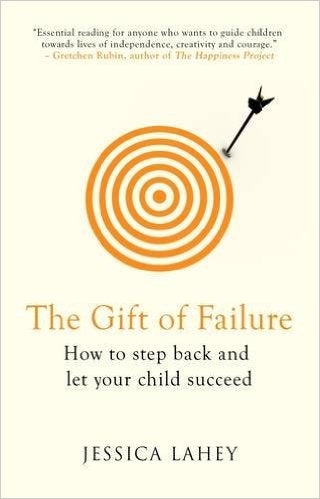The Gift of Failure: How to Step Back and Let Your Child Succeed, By Jessica Lahey - Book review
Short Books, £14.9

Your support helps us to tell the story
From reproductive rights to climate change to Big Tech, The Independent is on the ground when the story is developing. Whether it's investigating the financials of Elon Musk's pro-Trump PAC or producing our latest documentary, 'The A Word', which shines a light on the American women fighting for reproductive rights, we know how important it is to parse out the facts from the messaging.
At such a critical moment in US history, we need reporters on the ground. Your donation allows us to keep sending journalists to speak to both sides of the story.
The Independent is trusted by Americans across the entire political spectrum. And unlike many other quality news outlets, we choose not to lock Americans out of our reporting and analysis with paywalls. We believe quality journalism should be available to everyone, paid for by those who can afford it.
Your support makes all the difference.With so many manuals around advocating constant parental involvement in every aspect of child-rearing, a book that calls for letting the young get on with minimum interference could seem a good counter-balance. Rather than have everything children do closely supervised, judged and usually praised, Jessica Lahey believes instead that parents must at all times “support autonomy rather than dependence”. But this new regime as she describes it here soon turns into a rigid system, with all the disadvantages attendant on following a formula rather than reacting more intuitively to a child as he or she might be at any particular moment. Spontaneity is at least honest; rehearsed book-learned nostrums too often reek of hidden attempts at over-all mind-control.
Lahey backs up her case with quotations from other child-rearing manuals with similarly arresting titles. As a serving teacher and mother, she claims to have changed her own behaviour towards the children in her life as a result of adopting this approach, and numerous anecdotes drawn from her family and neighbourhood are used to back up her current beliefs. But too many massive generalisations are also allowed to fall without qualification. “Children who like their parents all the time tend not to be children who are corrected when they misbehave, or asked to consider the needs of other people.” Who says?
Her vision of school as a place where all children live in perpetual fear of failure is also ludicrous. Any pupil of this sort is of course one too many, but visiting a reasonably good modern school, state or otherwise, usually reveals mostly cheerful children interacting positively with each other and with their teachers. As for today’s state of “enmeshment”, where so many former children meekly move back into their bedrooms after leaving university, this surely is primarily caused by housing and money shortages rather than by offspring who have “failed to launch” due to their parents’ past over-protective practices.
For an author who was still tying her son’s shoe-laces when he was aged nine, writing this book has clearly taught her some useful lessons. Any pushy dads and helicopter mothers still out there could also learn a thing or two from it. But for most normal parents, a walk with their children in the country or a popular family game stripped of any self-improving agenda could ultimately make for time far better spent than reading this well-intentioned but superficial study.
Join our commenting forum
Join thought-provoking conversations, follow other Independent readers and see their replies
Comments